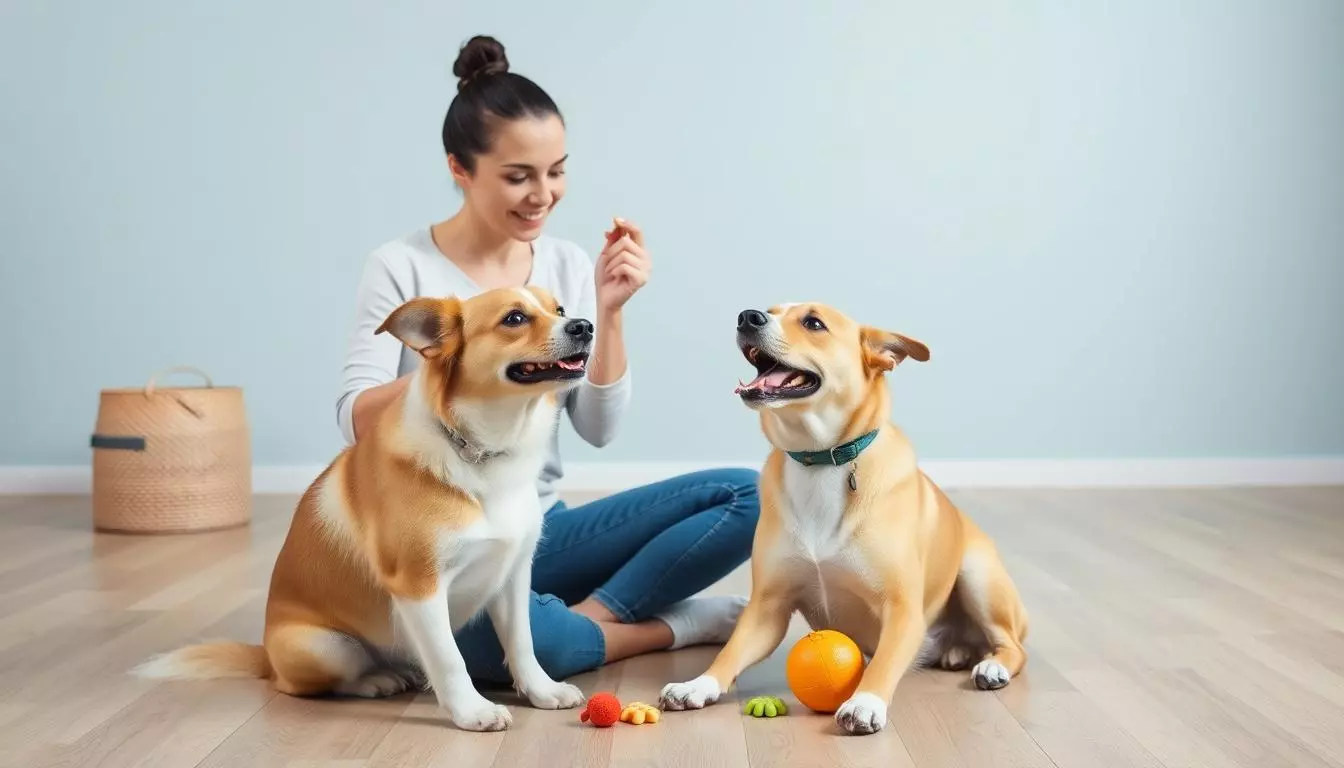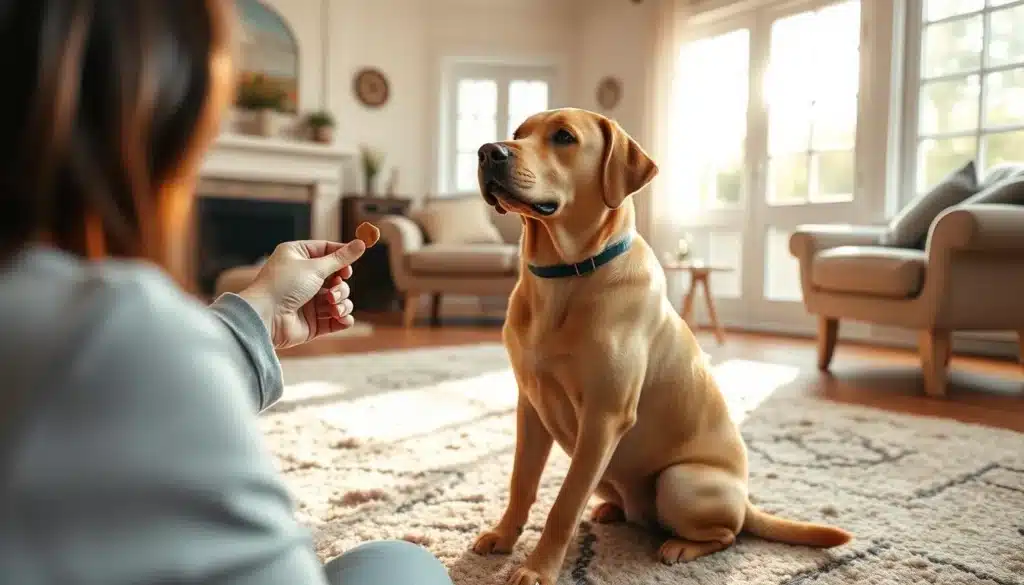As a lifelong dog lover, I've learned that finding the best dog for training isn't just about picking a breed. It's about understanding the unique connection between a dog and its owner. Every tail wag, every attentive ear tells a story of potential partnership and mutual understanding.
Training isn't just about commands; it's about building a deep, meaningful relationship with your canine companion. Some breeds naturally excel in learning and responding to guidance. This makes the journey of does online dog training work both exciting and rewarding.
Dr. Stanley Coren's research reveals fascinating insights into canine intelligence. He highlights breeds like Border Collies, German Shepherds, and Golden Retrievers as top performers in trainability. These dogs aren't just pets – they're intelligent partners ready to learn and grow alongside their human families.
Key Takeaways
- Dog trainability depends on breed-specific traits and individual temperament
- Intelligence and eagerness to please are crucial for successful training
- Online dog training can be effective with the right breed and approach
- Some breeds naturally excel in learning and responsiveness
- Training strengthens the bond between dogs and their owners
Understanding Dog Intelligence and Trainability
Dog intelligence is more than just following commands. It's key when training for conformation or coon dog events. Knowing how dogs learn is essential for success.
Every dog breed is different, affecting how well they learn and respond to training. To understand canine intelligence, we must explore several important factors.
Critical Factors Influencing Training Success
Several things affect a dog's ability to learn:
- Genetic predisposition
- Individual personality traits
- Early socialization experiences
- Breed-specific instincts
Breed-Specific Trait Considerations
Dogs were bred for specific jobs, which affects their trainability. Working dogs like German Shepherds do well in structured settings. But independent breeds might need different training methods.
Training Method Effectiveness
Choosing the right training method is crucial for conformation or coon dog training. Positive reinforcement works best for most breeds.
"Understanding your dog's unique intelligence is the first step to successful training." - Professional Dog Trainer
German Shepherd: The Ultimate Versatile Working Dog
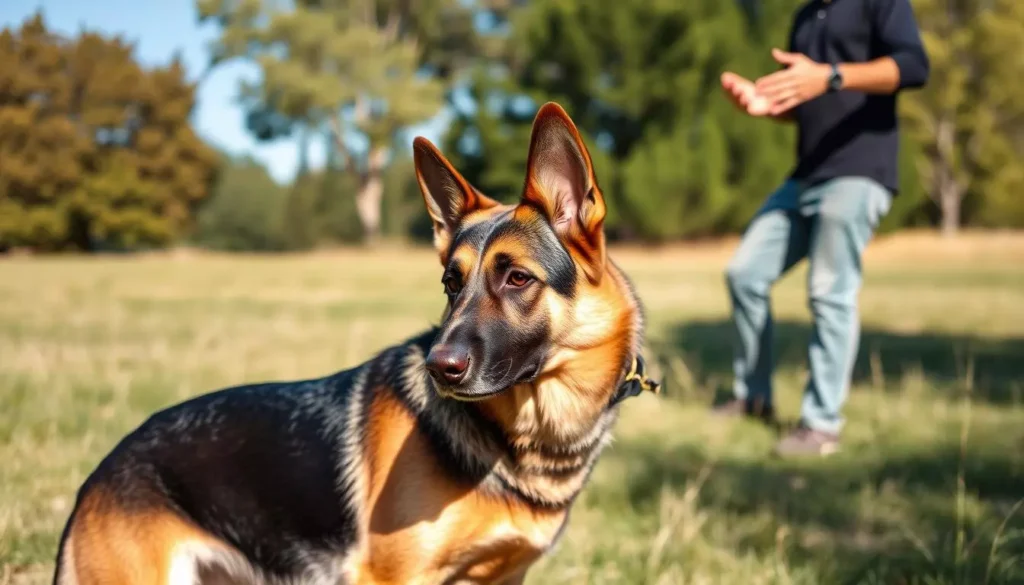
German Shepherds are top-notch working dogs, known for their versatility in rucker dog training and professional roles. They are smart and loyal, making them perfect for tough training environments.
These amazing dogs do well in many areas, such as:
- Police and military operations
- Search and rescue missions
- Disability assistance
- Sled dog training specialized tasks
My time with German Shepherds shows their incredible skills. They learn fast and can handle tough tasks with ease.
Key training strengths include:
- High cognitive processing abilities
- Strong work ethic
- Deep desire to please handlers
- Adaptable problem-solving skills
Training German Shepherds needs a structured, consistent approach. They need both mental and physical challenges. This keeps them sharp and ready for anything.
"A well-trained German Shepherd is not just a pet, but a dedicated partner ready to tackle any challenge."
German Shepherds are naturally focused and work well in many settings. This is why they're so respected as working dogs around the world.
Border Collie: Master of Mental Agility and Herding
Border Collies are known as the top dogs in intelligence and work ethic. As someone who loves dog training, I've seen how they make slip lead training look easy.
These dogs are more than pets; they're mental giants. In twin ports dog training, they're famous for solving complex tasks quickly.
Working Drive and Problem-Solving Abilities
Border Collies have a unique drive that makes them stand out. Their problem-solving skills are amazing:
- Can learn up to 200 verbal commands
- Excel in advanced obedience and agility training
- Demonstrate extraordinary mental adaptability
Exercise and Mental Stimulation Needs
These smart dogs need lots of mental and physical activities to stay happy. Here's what I suggest:
- Daily challenging training sessions
- Interactive puzzle toys
- Varied exercise routines
Training Challenges and Solutions
Training a Border Collie needs creativity and dedication. Their focus can be too much without the right guidance.
| Challenge | Solution |
|---|---|
| Overexcitement | Structured training with clear boundaries |
| Boredom | Constantly varied training techniques |
| High Energy | Comprehensive daily exercise regimen |
Pro tip: Always keep training sessions short, engaging, and mentally stimulating to maintain your Border Collie's interest and enthusiasm.
Best Dog for Training: Top Breeds for Obedience
Looking for the best dog for training? Some breeds are known for their smarts and eagerness to learn. My experience in lubbock dog training shows that certain breeds are better at following commands.
These top breeds have traits that make them great for both new and experienced owners. Here are the most trainable dogs that do well in obedience:
- Labrador Retriever: Known for their eagerness to please
- German Shepherd: Highly intelligent and adaptable
- Poodle: Extremely smart and responsive to training
- Border Collie: Unmatched mental agility
- Golden Retriever: Gentle and quick learners
I've made a detailed comparison to help you see how these breeds train:
| Breed | Intelligence Level | Training Difficulty | Best For |
|---|---|---|---|
| Labrador Retriever | High | Easy | Family Training |
| German Shepherd | Very High | Moderate | Professional Work |
| Poodle | Exceptional | Easy | Versatile Training |
| Border Collie | Extremely High | Challenging | Advanced Obedience |
| Golden Retriever | High | Easy | Family & Therapy Work |
Choosing the right breed for training in lubbock depends on your needs and lifestyle. Remember that individual dogs within a breed can vary. The right training methods are key to success.
Labrador and Golden Retrievers: Family-Friendly Training Stars
Labrador and Golden Retrievers are top picks for families in the United States. They are easy to train and gentle, making them great for all dog owners. These breeds do well in many training settings, from landheim dog training to leerburg dog training.
These breeds are similar in how they learn and interact with people. Their smart nature and desire to please make training a breeze.
Comparing Training Styles
Each breed has its own training style:
- Labradors are more energetic and love food
- Golden Retrievers are a bit more sensitive
- Both breeds love positive reinforcement
Suitable Training Activities
| Activity | Labrador Suitability | Golden Retriever Suitability |
|---|---|---|
| Retrieving Games | Excellent | Excellent |
| Water Training | Outstanding | Very Good |
| Obedience Classes | Very Good | Excellent |
Common Training Challenges
While these breeds are easy to train, they face some challenges:
- High energy levels needing regular exercise
- They can get too excited during training
- They need mental challenges as well as physical ones
Professional training from landheim dog training and leerburg dog training can help with these issues.
Poodle: The Elegant Intelligence
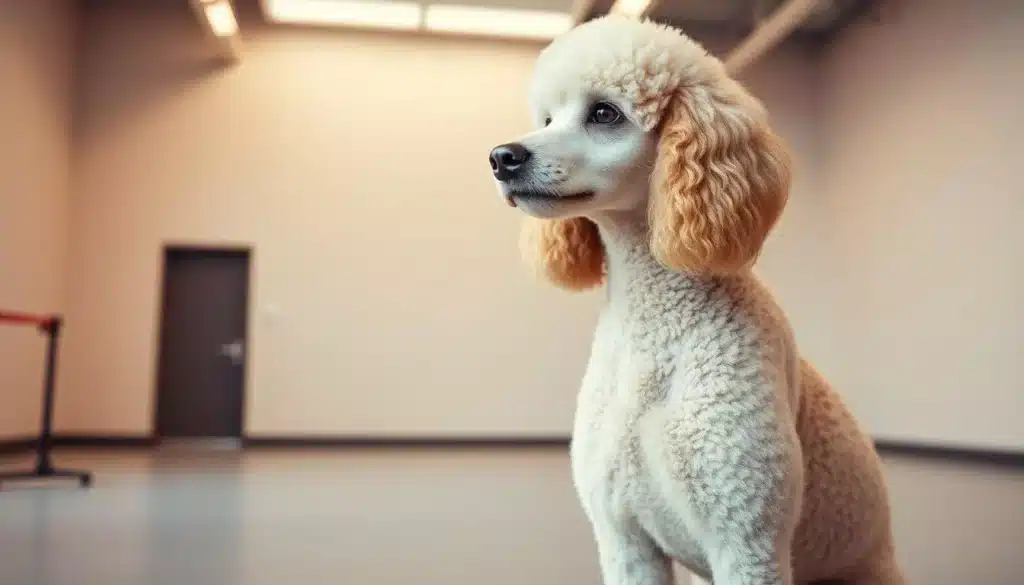
Poodles are among the smartest dog breeds for training. They are perfect for owasso dog training programs. Poodles learn fast and are great companions.
These dogs are more than just good-looking. Their smarts come from their long history as working dogs. Poodles do well in dog sports and training, showing their sharp minds.
- Extremely intelligent and quick to learn
- Eager to please their owners
- Versatile in different training scenarios
- Excellent problem-solving skills
Poodles need mental challenges to be happy. Their sharp minds crave challenges and variety in training routines. Use puzzle toys, advanced obedience, and games to keep them interested.
| Training Aspect | Poodle Performance |
|---|---|
| Obedience | Exceptional |
| Agility | Outstanding |
| Trick Training | Highly Proficient |
"A poodle's intelligence is not just about following commands, but understanding the deeper context of training." - Professional Dog Trainer
If you're looking into owasso dog training or online training for poodles, they do well with both. Their smart nature makes them fit for various training styles.
Working Breeds: Doberman and Rottweiler
Doberman Pinschers and Rottweilers are top-notch working breeds. They have great potential in dog training. These dogs are powerful and loyal, making them great companions for those who need protection.
To understand these breeds, you need to know their complex nature. They require specific training. Coon dog training can help develop their skills and manage their strong personalities.
Protection Training Capabilities
Dobermans and Rottweilers are great at protection work. They have natural guarding instincts. Their training can include:
- Advanced obedience skills
- Personal protection techniques
- Perimeter monitoring
- Threat assessment
Temperament Considerations
Training them well depends on knowing their temperaments. Consistent leadership and early socialization are key. They need to be balanced and confident.
| Breed | Temperament Traits | Training Focus |
|---|---|---|
| Doberman | Intelligent, Alert, Loyal | Precision, Discipline |
| Rottweiler | Confident, Protective, Calm | Control, Restraint |
Training Requirements
These breeds need special training that mixes discipline with positive reinforcement. Handlers must spend a lot of time on:
- Clear communication
- Building trust
- Structured exercise routines
- Mental stimulation
With the right training, these breeds become amazing companions. They can perform well in many working environments.
Smaller But Mighty: Papillon and Shetland Sheepdog
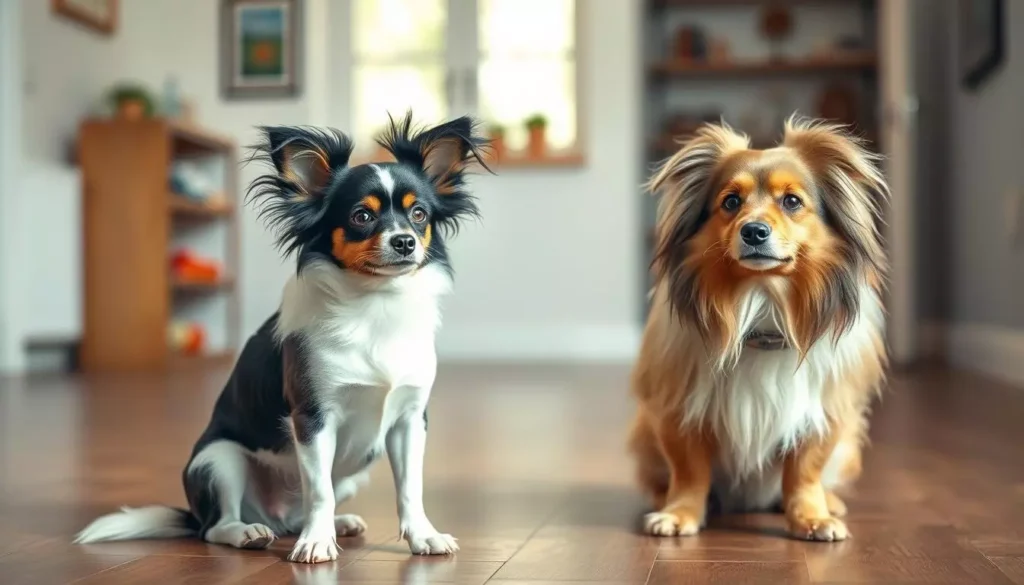
Size doesn't matter when it comes to training dogs. The Papillon and Shetland Sheepdog show that even small dogs can be very smart and easy to train.
Papillons are amazing little dogs. They have big skills for their size, doing well in dog sports and sled training. Their quick minds and eager nature make them great at learning tricks and agility.
- Highly intelligent and responsive to training
- Energetic and eager to please their owners
- Adaptable to different training environments
Shetland Sheepdogs, or Shelties, are also very smart. They are herding dogs with great problem-solving skills. They love to work with their owners.
| Breed Characteristic | Papillon | Shetland Sheepdog |
|---|---|---|
| Size | Small (7-10 lbs) | Small to Medium (15-25 lbs) |
| Intelligence Ranking | Top 10 Smart Breeds | Top 5 Smart Breeds |
| Training Difficulty | Easy | Very Easy |
Working with these breeds has shown me their amazing learning abilities. Both Papillons and Shelties prove that with the right training, small dogs can achieve great things.
"Small dogs, big personalities - that's the magic of effective dog training!" - Professional Dog Trainer
Australian Breeds: Cattle Dog and Shepherd
Australian working dogs are among the smartest and most energetic dog breeds globally. They add a lot of energy and purpose to dog training, especially in places like twin ports dog training programs.
Australian Cattle Dogs and Australian Shepherds are known for their top-notch working skills and sharp minds. They do well in training because of their strong herding instincts and intelligence.
Herding Instincts and Training Potential
These breeds have amazing herding instincts that can be used in training. Their natural ability to control and guide makes them great for specific training programs.
- Australian Cattle Dogs have intense focus and determination
- Australian Shepherds showcase remarkable problem-solving skills
- Both breeds require consistent mental stimulation
Effective Training Techniques
Training these Australian breeds needs a smart plan that matches their energy and smarts. Positive reinforcement and structured activities are best for keeping them engaged and motivated.
Exercise Requirements
Australian working dogs need a lot of physical activity to stay mentally and physically healthy. Their daily routines should include:
- Extended walking or running sessions
- Interactive play activities
- Agility training exercises
- Mental stimulation games
Knowing these breeds' special traits is key to successful training in slip lead dog training and other programs.
Training Challenges for Different Breed Types
Exploring dog training in Lubbock shows that not all dogs learn the same. Some breeds face special challenges that need unique training methods.
Some dog breeds are known for being independent and hard to train. These breeds often fall into certain categories:
- Independent breeds like Afghan Hounds
- High-energy working dogs
- Breeds with strong prey drives
- Highly intelligent but stubborn dogs
Through my experience with landheim dog training, I've found that knowing a breed's traits is key. Each breed needs a training approach that fits their natural behavior and personality.
| Breed Type | Training Difficulty | Key Challenges |
|---|---|---|
| Hounds | High | Independent thinking, scent-driven |
| Herding Breeds | Moderate | High energy, intense focus |
| Terriers | Challenging | Stubborn personality, strong-willed |
Training success comes from patience, consistent positive feedback, and knowing each breed's special traits. Adaptability is key when dealing with dogs that learn in complex ways.
The most challenging dogs often become the most rewarding companions when trained with understanding and respect.
Essential Training Tips for Success
Mastering dog training needs a smart plan that includes patience, understanding, and good methods. In leerburg dog training, I've found key points that make training easier and more successful.
Positive reinforcement is the base of good dog training. It builds trust and a strong bond. In owasso dog training, I've seen great results when owners reward good actions instead of scolding bad ones.
- Use high-value treats as motivation
- Keep training sessions short and engaging
- Practice consistent command language
- Understand your dog's individual learning style
Being consistent is crucial for great training results. Dogs love predictable routines and clear rules. I suggest setting a regular training schedule that matches your life and your dog's energy.
| Training Approach | Key Benefits |
|---|---|
| Positive Reinforcement | Builds confidence, strengthens bond |
| Consistent Training | Establishes clear communication |
| Early Socialization | Reduces anxiety, improves adaptability |
Professional training resources are very helpful. Investing in quality training classes or consulting experienced trainers can speed up your dog's learning and help you communicate better.
"Training is not about perfection, but about progress and partnership." - Professional Dog Trainer
Every dog is different. What works for one might not work for another. Stay patient, stay positive, and celebrate small wins on your training journey.
Conclusion
Training a dog is more than just knowing their breed. Dogs like German Shepherds and Border Collies might learn faster. But every dog can become a great friend with the right training.
Choosing the right dog for training means thinking about your life and home. Each breed has its own strengths and challenges. It's important to know your dog's personality and train them in a way that fits.
My research shows that the best training comes from a strong bond with your dog. Being patient, using positive methods, and spending time together are key. No matter the breed, your effort will shape their behavior.
The best part of dog training is the bond you create. With love, patience, and understanding, any dog can become a loving and loyal friend. This friendship will make your life richer in many ways.

